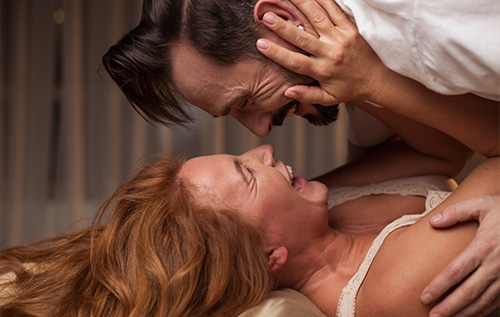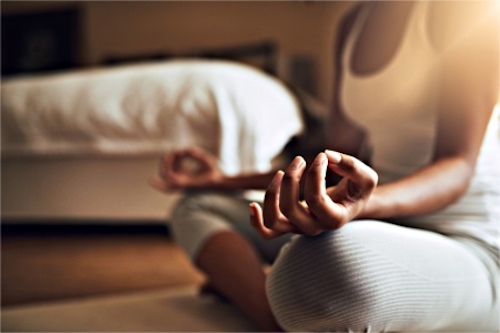Do you want to have better sex, more frequent sex, or amp up your desire? You are not alone. Many of the women we talk with miss the sexual desire they felt in their twenties and early thirties, but feel lost about how to get it back. We spoke with Barbara Carrellas, sex educator and author of Ecstasy is Necessary, Urban Tantra, and Luxurious Loving, about how women can foster more desire and steamier sex.

Barbara reminds us that great sex is often the result of the “right amount of safety with the right amount of risk.” But how do we move out of our sexual comfort zones to take erotic risks? Read our intimate interview with Barbara Carrellas to find out.
SPECIAL NOTE FROM WOMEN’S HEALTH NETWORK: The following article is an honest discussion about women’s sexual health that includes adult themes and vocabulary. If you would rather choose an alternate topic, please explore our other women’s health articles.
WHN: The struggle for pharmaceutical companies to come up with a “pink Viagra” has been blamed on the fact that for women sexual arousal is not simply rooted in the physical, but has a great deal to do with the psychological. Once the physical aspects are supported, do you have tips to prime women for psychological arousal?
BC: I think people erroneously equate arousal with desire. You can be physically aroused by something and yet have no actual desire for it. Years ago I read a study in which volunteers were shown sexually explicit videos featuring different sexual orientations, i.e., male homosexual activity, lesbian sexual activity, heterosexual activity. The subjects’ genitals were outfitted with various devices to measure arousal. When, for example, the lesbian women were shown gay male porn or heterosexual porn, they measured the same level of physical arousal as when they watched lesbian porn — even though they reported not feeling aroused by the non-lesbian material. What was missing? Their desire for the gay male or heterosexual activity.
I advocate an approach that unites physical and psychological desire. When we focus on the erotic sensations our bodies feel, desire for more of those sensations usually follows. Honestly, sex is a habit as much as it is a drive. When we get out of the habit of having sex, or of feeling desire, we think we’ve lost all interest in sex. My advice is practice, practice, practice. Re-prime your erotic pump with regular, scheduled masturbation sessions. Stay focused on your body. If fantasies arise, enjoy them. If not, just breathe and stay focused on what you’re feeling.
WHN: In a recent interview, Esther Perel, author and therapist said, “Sexual desire is not about being good citizens. Sexual excitement is politically incorrect and often thrives on power plays, role reversals, demands, seduction, manipulation…” What advice do you have for those women who feel hesitant to act out a fantasy or to even allow themselves to think about a certain fantasy because it seems too weird or politically incorrect?
BC: First, know that whatever your fantasy, many other people have wilder, more politically incorrect ones. I know — I’ve heard many of them. You are not the sickest person in the room — I promise. And please don’t think you have to act out your fantasies. Many (if not most) fantasies should stay just that — fantasies! Acting them out could be dangerous on a variety of levels. Or perhaps you could act out just one aspect of a dangerous fantasy in a safe, controlled role-play scene. (Common fantasies, such as having sex in public and rough sex can easily be staged in ways that are satisfying but safe.)
If shame and guilt are crippling your ability to enjoy the pleasure of your erotic imagination, try this little exercise. Ask yourself:
“What was the loudest message I received around sex while I was growing up?”
“How is this message still haunting me?”
“Where and when does it crop up?”
The next time you feel shame about a fantasy, stop and ask yourself, “Whose voice is this telling me this is wrong?”
And remember, the hottest sexual experiences are a result of the right amount of safety and the right amount of risk. So if a little fear or apprehension is present, great! Step outside your comfort zone — feel the fear and do it anyway.
WHN: Talking to sexual partners about what we want and need in the bedroom can be difficult for some women. Do you have any advice about how to go about that?
BC: Approach discussions about sex from an “I wonder what more is possible for us” place rather than a “We must fix what’s wrong” space. Ask yourself, “How can I make this a playful game instead of hard, scary work?” One game I like is the Yes-No-Maybe game. Look up or think up as many different sexual activities as you can. One by one, ask your partner, Yes? No? Or maybe? They then tell you if what you named was an unqualified Yes, meaning “Absolutely — right here, right now!” Or an absolute No, meaning, “Absolutely not — under no circumstances. Never.” Or a Maybe, meaning, “If the conditions and timing were just right, yes, I can imagine wanting to do that.”
WHN: Researchers in the Netherlands have found that men can be turned on by the same images day after day, while women need new stimuli. Where can women turn (other than to porn) for new sexual stimuli?
BC: Why leave out porn? Sexually explicit material is a huge source of new stimuli. The trick is to find porn you like. I suggest the work of feminist pornographers such as Tristan Taormino, Candida Royalle, Courtney Trouble, Madison Young, Shine Louise Houston, Jincey Lumpkin, Ovidie, and Erika Lust. Some of these directors make pornography specifically for a female or gender-queer audience. Others try for a broad appeal across genders and sexual orientations.
Curious about what makes porn feminist? The Feminist Porn Awards, held annually in Toronto, have three guiding criteria: 1) A woman had a hand in the production, writing, direction, etc. of the work. 2) It depicts genuine female pleasure. 3) It expands the boundaries of sexual representation on film and challenges stereotypes that are often found in mainstream porn.
WHN: You said in a previous interview that “Sex is play… We get very hung up about what doesn’t work the way it used to work or what ‘the magazine’ said it was supposed to look like. There are an infinite number of erotic possibilities.” Do you have examples of how women might bring more “play” into their sex lives?
BC:
1) Release your expectations. Life seldom turns out the way we planned. Why should sex?
2) Release your goals. Goals keep us focused on the future, such as “I wonder if I’m going to be able to orgasm?” When you are focused in the future (or the past) you are missing every juicy thing that’s going on right now. Focus on your breath and on the sensations you are feeling right now. In truth, great sex is simply one intensely playful mindfulness meditation.
3) Be willing to giggle, laugh, and look silly. Hot sex is often funny, and nothing feels better than a great gigglegasm.
Welcome to a new approach to sex
Women’s Health Network is dedicated to women’s health and happiness. What better way to find both than in satisfying sexual experiences? For more information about the physical aspects of arousal, see Dr. Mary James’ article on Understanding arousal in women. Learn more sex tips from Barbara Carellas in Sexology 101.
| Are you ready to explore even steamier options?  |










